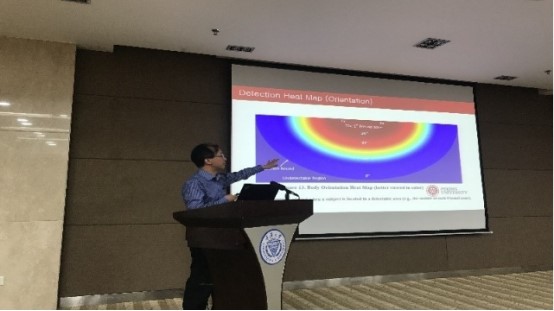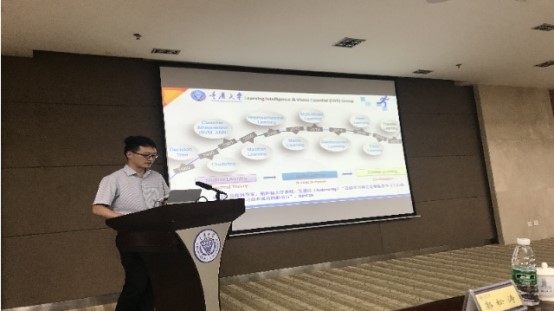On May 25, 2018, the Intellisense and Urban Computing Forum and 2018 Jinyun Forum of Association of Young Scientists and Technologists of Chongqing University, sponsored by China Computer Federation (CCF), and co-organized by the School of Computer Science and the Association of Young Scientists and Technologists of Chongqing University, opens at Conference Room 0506 of the Main Teaching Building, Campus A, Chongqing University. The Forum is chaired by Chen Chao, an associate professor of Chongqing University, and Li Shijian, an associate professor of Zhejiang University. Well-known scholars at home and abroad have been invited to the Forum to discuss the current progress and future trend of intellisense and urban computing. The main content of the Forum includes: New-type wireless sensing technology and human action recognition, intelligent human-machine-material integration, mobile edge computing, transfer learning and smart cities, crowd sensing task assignment and incentive strategy and urban emergency response.

During the Forum, scholars and experts have made representations on their research work in a vivid and lively manner. Zhang Daqing, an expert from Beijing University, proposed new ideas about quota portray of the relation between wireless signal and human action, and applied the Fresnel zone diffraction model to non-contact human respiration detection based on wireless signals. Guo Songtao, a professor from Southwest University, discussed the transfer of computing tasks on the smart mobile devices onto the edge cloud computing system, so as to minimize the computing load on the smart mobile devices. Professor Zhou Changbing, a professor from China University of Geosciences, proposed a suitability evaluation mechanism that considers new-type scientific workflow, based on descriptive characteristics of hierarchy scientific workflow. Wang Leye, a researcher of Hong Kong University of Science and Technology, discussed the way to mitigate impact of data missing in the smart city development through transfer learning technology, so as to allow the smart city service to achieve a better performance in the cold start stage.

Chen Longbiao, an assistant professor from Xiamen University, discussed new ideas of application of mobile behavior bid data analysis to urban emergency response, with the typhoon and water-logging automatic monitoring based on track big data in Xiamen. In addition, Assistant Professor Chen also introduced the current progress and future direction of the emergency response research in process. Wang Jiangtao, an assistant researcher from Beijing University, introduced his research in areas such as mobile crowd-sourcing computing from two aspects, including the optimal assignment of urban sensing tasks and association behavior recognition and health management. Xiang Chaocan, a lecturer from the Logistic Engineering University of PLA, proposed the possibility of encouraging users to participate in the sensing tasks by making it easier for users to participate, arousing enthusiasm of users about the tasks and expanding the sensing scale of users. Zhang Lei, a researcher of Chongqing University introduced the concept and methodology of transfer learning, and discussed several non-supervision and semi-supervision transfer learning modes based on reconstruction of visual characteristics and a kind of transfer leaning of deep network self-confrontation.

More than 100 students and teachers and representatives from the School of Computer Science, the School of Electrical Engineering and the School of Mechanical Engineering of Chongqing University and more than 10 big data related technological companies in Chongqing have attended the Forum and involved actively in the discussion. Many attendants say that they have benefited a lot from participating in this academic event.
